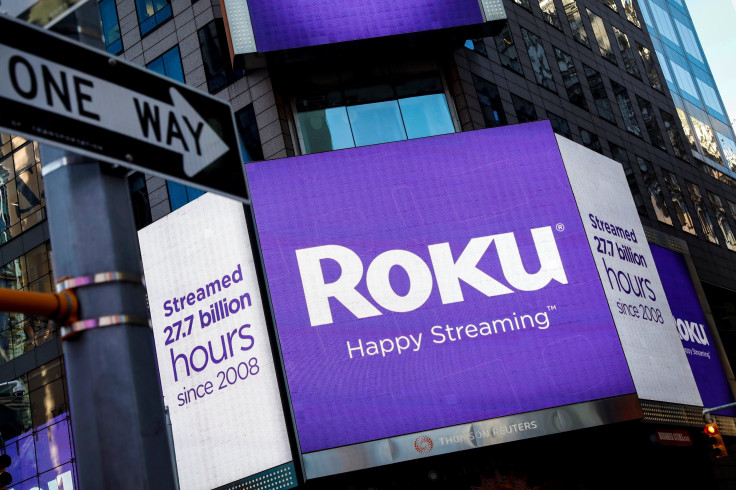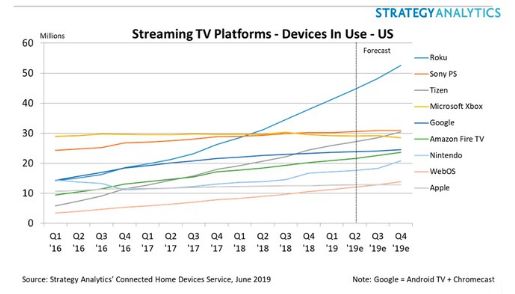Roku Continues To Dominate The Streaming Device Market

Transitioning from being solely a hardware company to a platform provider is paying off big for Roku (NASDAQ:ROKU), which turned in another incredibly impressive performance in the second quarter. Sales of its streaming-player devices grew 24% year over year in the period, while platform revenue -- mostly driven by advertising -- surged 86% to $167.7 million and now accounts for over two-thirds of Roku's total.
It's all part of a virtuous cycle of growth between the sale of streaming devices and adding ever greater numbers of channels to its platform. The more content it adds, the more devices it sells, and the greater the number of advertisers that want to be on the platform -- leading to more channels appearing, and so on.
And management promises this is only the beginning.
Must-see TV
Roku doesn't break out how much advertising contributes to the revenue total. But CFO Steve Louden shared with analysts on its most recent earnings conference call that "monetized video ad impressions once again more than doubled year over year, and we expect that trend to continue throughout 2019."
Roku now has 30.5 million active user accounts, up 1.4 million from the first quarter and 38% more than the 22 million it had a year ago. Just as important is that those accounts are becoming more valuable, with average revenue per user now hitting $21.06, up $2 from Q1 and almost $5 more per user than last year.
That's an environment any advertiser would flock to, and it also makes content providers want to have their channels on Roku devices. Disney recently announced its own streaming service that would package Disney programming, ESPN+, and Hulu for $12.99 per month. While it's not certain the service will appear on Roku, the general manager of platform services at Roku, Scott Rosenberg, said "we are excited, to say the least, about the coming services into [over the top] and believe that we are an essential platform for these new services."
Those would also likely include Apple, AT&T, and several other big content owners that are launching their own services and will undoubtedly want to be on Roku.
Roku remains the one to beat
It all underscores why Roku remains the leading streaming-media player company. The most recent data from Parks Associates shows Roku had a 39% market share at the end of the first quarter of 2019, 2 percentage points greater than two years ago. Together, Amazon.com (NASDAQ:AMZN) and Roku control almost 70% of the streaming market.
Yet for all of Roku's growth, it may not be long before Amazon overtakes it for the top spot with its Fire TV device. Amazon trailed Roku with a 30% share, up from 24% at the end of the first quarter in 2017. At that rate, Amazon could become the industry leader in around three years. But other data suggests it may not be so easy to catch Roku.
Strategy Analytics previously forecast that by the end of this year, there will be 52 million Roku devices in use, including Roku media streamers and Roku-based smart TVs, extending to 36% its lead over Sony and its PlayStation console. Samsung, however, is on a path to top Sony very soon as its Tizen smart-TV operating system gains ground.
Smart TVs could be the next growth phase for streaming, and Roku's partnership with TCL has caught the wave perfectly. The Strategy Analytics report praises the combination, noting, "Roku has managed to establish itself as a highly respected and trusted brand in the U.S. with no perceived hidden agenda when it comes to promoting content on its platform."

A duopoly of streaming
Although Roku, Amazon, Apple, and Google once battled for supremacy in the vibrant streaming-player market, it has since become a two-horse race. Only Roku and Amazon really matter, while the others are left fighting for the scraps.
Amazon is pouring billions into content to make its Fire TV the premiere destination, but Roku looks like it will remain king of streaming for some time to come.
This article originally appeared in the Motley Fool.
Rich Duprey has no position in any of the stocks mentioned. The Motley Fool owns shares of and recommends Amazon, Apple, Roku, and Walt Disney. The Motley Fool has the following options: long January 2021 $60 calls on Walt Disney, short October 2019 $125 calls on Walt Disney, short January 2020 $155 calls on Apple, long January 2020 $150 calls on Apple, short January 2020 $155 calls on Apple, and long January 2020 $150 calls on Apple. The Motley Fool has a disclosure policy.





















